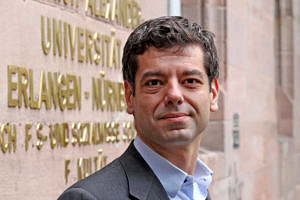The future of relations between the European Union and Latin America

FAU part of an international consortium hoping to redefine the relationship
Global political relations are shifting. Old alliances are being questioned, new ones are being forged. You only need to look at the election of Donald Trump in the USA, Jair Bolsonaros in Brazil, or Brexit. The European Union (EU) and the idea of Europe have lost popularity within certain groups and it would appear as if some states now prefer economic protectionism over a global trade community. Prof. Gian Luca Gardini, Chair of International Business and Society Relations with Focus on Latin America, is a proven expert on the partnership between the EU and Latin America. Since 2018, he has been a member of an international consortium which aims to investigate and analyse the relationship between the two regions and make recommendations for future policy.
Universities from Chile, Ecuador, Sweden and Spain involved alongside FAU
The international consortium was founded by Prof. Paulina Astroza, Universidad de Concepción in Chile. She also works for the Chilean Ministry of Foreign Affairs and has already worked together with Prof. Gardini several times. “The decision to found the consortium was the result of an ongoing collaboration between the researchers, who are all experts on the relationship between the EU and Latin America”, explains Prof. Gardini. “Lately, relationships have stagnated in the face of changed circumstances as well as political and economic challenges. The consortium would like to make a contribution to redefining the relationship between the two regions.” As well as FAU and Universidad de Concepción, Chile, the members of the consortium come from Stockholms universitet, Sweden, Universidad Andina Simón Bolívar, Ecuador, Universidad Diego Portales, Chile, and Universidad de Alicante and Universidad Carlos III de Madrid, Spain.
Concrete measures include scientific research, recommendations for political action and seminars
The members of the consortium initially plan to organise two large seminars, to be held in Chile in 2019 and Sweden in 2020, under the title “Relations between the European Union and Latin America: Future Scenarios in a Changing World.” “We will bring together researchers and political stakeholders to clearly and systematically identify the challenges and obstacles on the path to a closer relationship between the EU and Latin America and regional organisations,” explains Prof. Gardini. The plan is for the consortium’s political proposals to be published on an online platform, which should then act as a recommended plan of action for stakeholders. The general public is also to be involved in the process of redefining the relations between Europe and Latin America. Information on the current status quo and prospects for the future of the bi-regional partnership will be broadcast via media such as television, radio, print media and the Youtube channel of the European Studies programme at Universidad de Concepción. “The seminars in Chile and Sweden will be broadcast live on Facebook and Instagram. The final publication will be used as teaching material for students at the universities involved in the consortium, including FAU,” continues Prof. Gardini.
In his capacity as a leading expert, Prof. Gardini has been instrumental in shaping the project. He will be a key speaker at the seminars and is responsible for leading the consortium’s outreach programme. His economic expertise is also called for, with his research focussing on three main aspects: the effects current political events such as Brexit or Brazil’s shift in diplomatic relations have on the European-Latin American relations, the diversity of regionalism and regional organisations in Latin America, and the significance of the EU-CELAC (Community of Latin American and Caribbean States) and EU-LAC (Latin America and Caribbean) groups for political dialogue. “In view of the new regional groups in Latin America, such as the Pacific Alliance, typical summit meetings are being replaced by political proposals for new formats of bi-regional dialogue,” says Prof. Gardini.
Prof. Gardini and his international colleagues are set to make a valuable contribution towards redefining the relations between the EU and Latin America in the current political context and creating a foundation for the continuing development of these relations on the basis of their research.
Contact:
Prof. Gardini
Chair of International Business and Society Relations with Focus on Latin America
Tel.: 0049 911/5302-656
E-Mail: gian.luca.gardini@fau.de